You deserve a good night’s sleep. But that may be easier said than done if you have hip pain. No matter how well you prepare for bed or how tired you are, hip pain can cause you to toss and turn all night.
So how can you sleep with hip pain? What steps can you take to ensure you not only sleep through the night but don’t wake up in more pain than when you fell asleep?
Read on to learn what causes hip pain, how hip pain impacts sleep and how you can combat hip pain day and night.
What Causes Hip Pain?
Hip pain is any pain you feel in or around your hip joint, where your thigh bone and pelvis connect. According to the Cleveland Clinic, you may feel hip pain in various places, including:
- Deep inside your hip joint
- Closer to the surface, above or around the joint
- In your lower back, in the case of radiating pain
Hip pain has various causes, including injuries, medical conditions and structural abnormalities.
Injury
Injuries from accidents or overuse can lead to short-term or long-term hip discomfort. You can acutely injure your hip in various ways, from straining a muscle during exercise to breaking your hip during a fall.
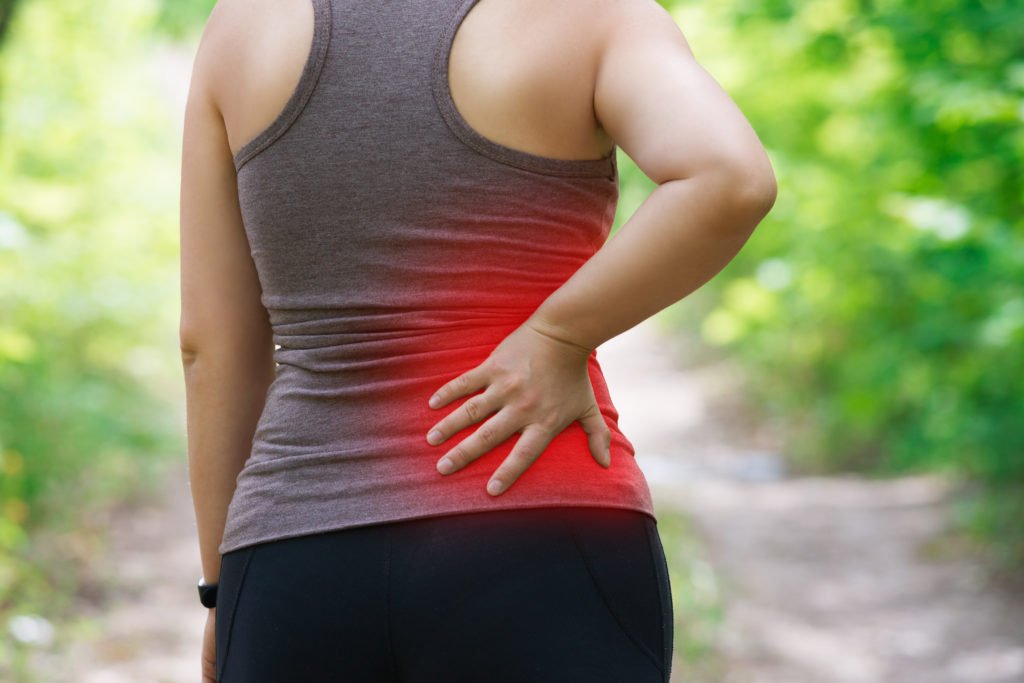
However, Temple Health experts explain that hip injuries are most commonly due to overuse, which they describe as “repetitive movements or tightness/imbalance in the muscle that places high stress on a muscle group or tendon.” So if you have hip pain that feels like an injury but can’t remember precisely when you injured it, overuse may be to blame.
Related: Sleep and Muscle Recovery
Spinal Alignment and Hip Alignment
Poor alignment can also lead to aches and pains in the hips. You may suffer from hip misalignment, which occurs when your hips are no longer aligned correctly in a level, centered position. There are various causes of hip misalignment, including medical conditions like scoliosis and anatomical features like different leg lengths.
Additionally, poor posture and spinal alignment can create tightness and pain in and around the hips at night–especially if you struggle with nighttime posture. Learn more about how to support proper spinal alignment at night in our article, Chiropractors and PTs Give Sleep Tips.
Sleep Position
If you sleep on your side and only feel hip pain when in bed, there is a good chance that your sleep position is the culprit. Side sleeping places pressure along your entire side body, including the hip. Particularly if your mattress is firm or does not offer enough pressure relief for your hip to sink in comfortably, pressure on your hip can directly cause hip pain.
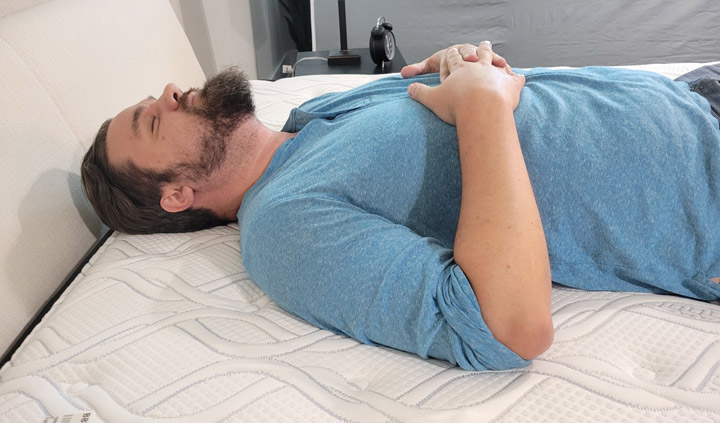
Stomach sleeping, too, can cause or exacerbate hip pain. When you sleep on your stomach, your pelvis often sinks into the mattress, moving your spine out of alignment.
Age
Joint pain becomes more common as we age. Poor body alignment, injuries, medical conditions and overuse can all contribute to worsening nighttime hip pain as we age.
If your hip pain while sleeping has increased with age, be sure you have a good mattress for seniors, and if you aren’t sleeping well, head over to our Senior Sleep Guide for some tips.
Bursitis
Bursitis occurs when the bursa–small jelly-like sacs that act as cushions between bones and soft tissues–become inflamed. It commonly affects the shoulders, knees, elbows and hips. Joint pain and tenderness are common symptoms of bursitis, and you may also notice swelling and warmth around the joint.
Bouts of bursitis last anywhere from a few hours to days in the case of acute bursitis to many weeks to months with chronic bursitis. Avoiding strain and overuse can ease bursitis pain.
Try to avoid sleeping on the affected side. If both hips have bursitis, sleeping on your back is your best bet for limiting pain.
Arthritis
A widespread ailment that becomes even more common as we age, arthritis refers generally to pain and inflammation of any joint.
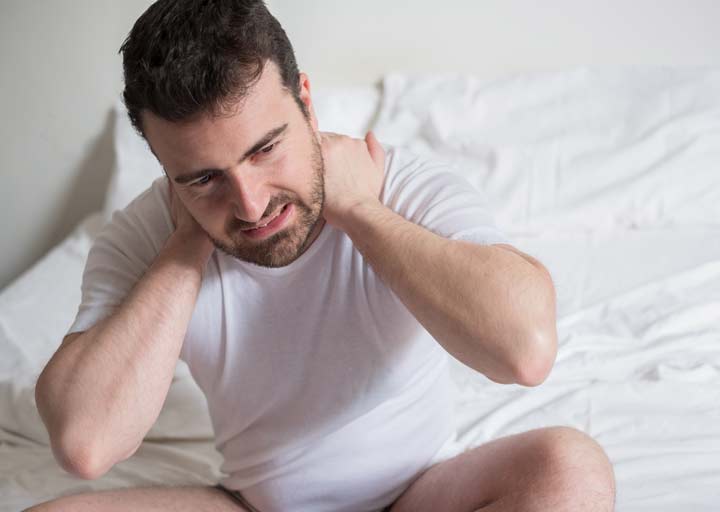
The hips are one area where arthritis can cause pain that leads to difficulty sleeping. If you suffer from arthritis and have trouble with sleep, check out our article, Sleeping with Arthritis.
Osteoarthritis
There are two major types of arthritis (though more than 100 types of arthritis and related diseases exist). Osteoarthritis is what most people mean when they generally refer to arthritis, particularly in the aging population.
Harvard Health Publishing explains that “osteoarthritis occurs when cartilage (tissue in your joints that cushions your bones) wears away.” This type of arthritis often develops gradually over several months or years due to wear and tear.
Rheumatoid Arthritis
Rheumatoid arthritis is an autoimmune disease and occurs when your body’s immune cells attack tissue in your joints. Although it can occur earlier in life, rheumatoid arthritis typically develops between the age of 30 and 60. Harvard Health Publishing notes that symptoms, including pain and stiffness, can develop over weeks to months, but it also often “begins with “flu-like” symptoms of fatigue, fever, weakness and minor joint aches.”
The joints most commonly attacked by rheumatoid arthritis reside in the hands, wrists and feet. However, it can appear in any joint, including the hips.
How Hip Pain Impacts Sleep
Any pain can make it hard to fall asleep and sleep soundly. If you have nighttime hip pain, you might find it hard to get comfortable, especially if you are a side sleeper. Lying on your side can cause or exacerbate existing hip pain.
Unfortunately, poor sleep inhibits healing and can exacerbate conditions like arthritis, worsening hip pain day and night. Additionally, research shows that we feel pain more intensely when we haven’t slept well, creating a cycle of worsening pain.
What Is the Best Sleeping Position for Hip Pain?
Back sleeping is the best sleep position for most people with hip pain. Sleeping on your back allows for proper spinal alignment and minimal pressure on the hip joints. Side sleeping is usually the worst position for hip pain due to direct pressure on your hip joint. And while stomach sleepers do not experience hip joint pressure, poor spine alignment in this position can lead to pain in the lower back and neck.
How to Sleep with Hip Pain
There are ways to sleep better with hip pain; you just need to take targeted, intentional steps to find relief.
Find the Right Mattress for You
The best mattress for hip pain is one that suits your sleeping position and body type. Look for a bed that supports spine alignment while minimizing pressure at sensitive areas like your hips and other joints.
Side Sleepers
Side sleepers—especially those with hip pain—require a bed with pressure-relieving top layers. Look for a mattress that ranges from medium-soft to medium-firm.
Back Sleepers
If you have ongoing hip pain, you may want to consider sleeping on your back. Most back sleepers find a good balance between lumbar support and cushion on medium-firm mattresses.
Stomach Sleepers
Stomach sleepers require a mattress with firm support to keep the mid-body from sinking into the bed. If you sleep on your stomach, opt for a medium-firm or firmer bed. Zoned mattresses often suit stomach sleepers thanks to added support in the center of the mattress.
Support with Pillows
Pillows are the key to sleeping with proper body alignment, no matter which position you sleep in. When using pillows to provide support, your goal should be to achieve a straight spine, without pulling your shoulders or pelvis out of alignment.
Even back sleepers (arguably the best position for avoiding hip pain while sleeping) can benefit from pillow support. Placing a pillow underneath your knees can offer lumbar support, and some sleepers also benefit from a thin pillow underneath the lower back.
Side sleepers can achieve good sleep posture by using a pillow between the legs (a body pillow works well) and hugging a pillow or placing one beneath the top arm. And as mentioned above, stomach sleepers often find the support they need to relieve pain by placing a pillow beneath the hips.
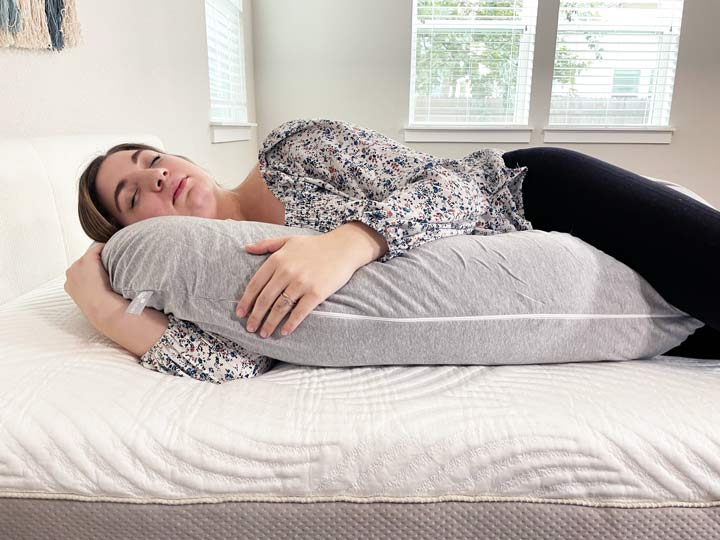
And, of course, don’t forget that your head is part of your body and should also be part of this alignment. Using the proper type of pillow for your sleep position can help you maintain alignment from head to toe.
Supplement with Heat or Cold Therapy
Hot and cold therapy can offer temporary relief if you have a hip injury or arthritis. The best option depends on the root cause and duration of your pain.
Avoid heat when treating an acute (short-term) injury, as it can increase inflammation and delay healing. Ice is best for injuries that are less than six weeks old. You can work heat in around this time if your injury leads to chronic pain.
For arthritis, the Cleveland Clinic notes that “moist heat, like a soak in a tub or shower of warm-but-not-hot water (92-100°F) helps.”
Take Medication
Over-the-counter non-steroidal anti-inflammatory drugs (NSAIDs) like ibuprofen offer quick relief for inflammatory hip pain. If your pain is the result of an acute injury or arthritis flare, these drugs may help you find relief.
Consult your doctor before using any pain reliever for more than 10 days in a row. If you have ongoing or recurring pain, discuss treatment options with a medical professional.
How to Combat Hip Pain During the Day
Stretch
Gentle movement and stretches throughout the day may ease hip pain. Especially if you sit all day, stretching can help keep your hips from growing tight and painful by bedtime. The Cleveland Clinic describes 10 yoga poses to help keep your hips limber.
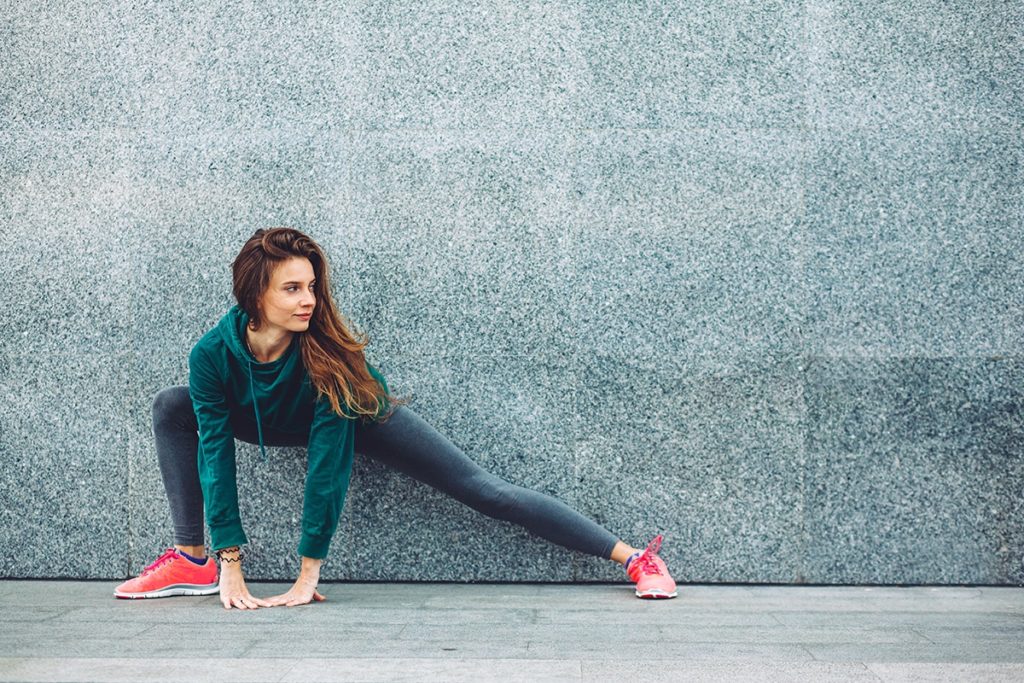
In addition to stretching, moderate exercise can help you get better sleep. Check in with your doctor before instituting a new workout routine if you experience hip pain.
Practice a Healthy Diet
What you eat and drink may not directly impact your pain, but it can help improve sleep quality. Nutrition and hydration are both key to sleeping well, which in turn may expedite healing from hip injuries. According to the Mayo Clinic, a healthy, anti-inflammatory diet like the Mediterranean diet may also help improve arthritis symptoms.
Practice Good Posture
Pay attention to your alignment as you go about your day. Set up your workspace with healthy posture and ergonomics in mind, and check in throughout the day to help slowly improve posture and reduce pain.
Take a Warm Bath or Shower before Bed
A warm bath or shower before bed helps relax muscles and ease body tension, which can help minimize nighttime hip pain. Additionally, the change in body temperature from a warm bath or shower makes you tired, which can make falling asleep easier.
Seek Medical Help
See your doctor or a physical therapist if your hip pain is long-lasting, intense or interrupts your sleep and daily routine. Hip pain can be a symptom of medical conditions or injuries that require medical intervention or physical therapy.
FAQs
How can I relieve hip pain while sleeping on my side?
To ease hip pain when sleeping on your side, select a pressure-relieving mattress that suits side sleepers and place a pillow between your legs. To ensure you’re fully aligned, use a proper pillow for side sleepers.
How can I relieve hip pain during pregnancy while sleeping?
When pregnant, make generous use of pillows. Side sleepers often benefit from placing one pillow between the legs and another to hug, while back sleepers may enjoy one beneath the knees. Check out our Pregnancy Sleep Guide for tips, and consider a pregnancy pillow for added comfort and support.
Can sleeping on the couch cause hip pain?
Sleeping on the couch can cause hip pain, especially for side sleepers. If you must sleep on a couch, opt for one with a pull-out mattress and upgrade your sleeper sofa mattress to one with support and pressure relief.
Can sleeping on a bad mattress cause hip pain?
Sleeping on a bad mattress can absolutely cause hip pain. Too firm of a bed places excess pressure on side sleepers’ hips, and old mattresses can cave in at the body’s midsection in every sleeping position. Be sure to replace your mattress every decade or so, and make sure to choose a comfortable mattress.
Can sleeping on an air mattress cause hip pain?
Sleeping on an air mattress can cause hip pain because these beds do not offer the pressure relief or support most sleepers require. If you must sleep on an air mattress, consider purchasing one that made our list of the Best Air Mattresses and take steps to make the air mattress more comfortable.

